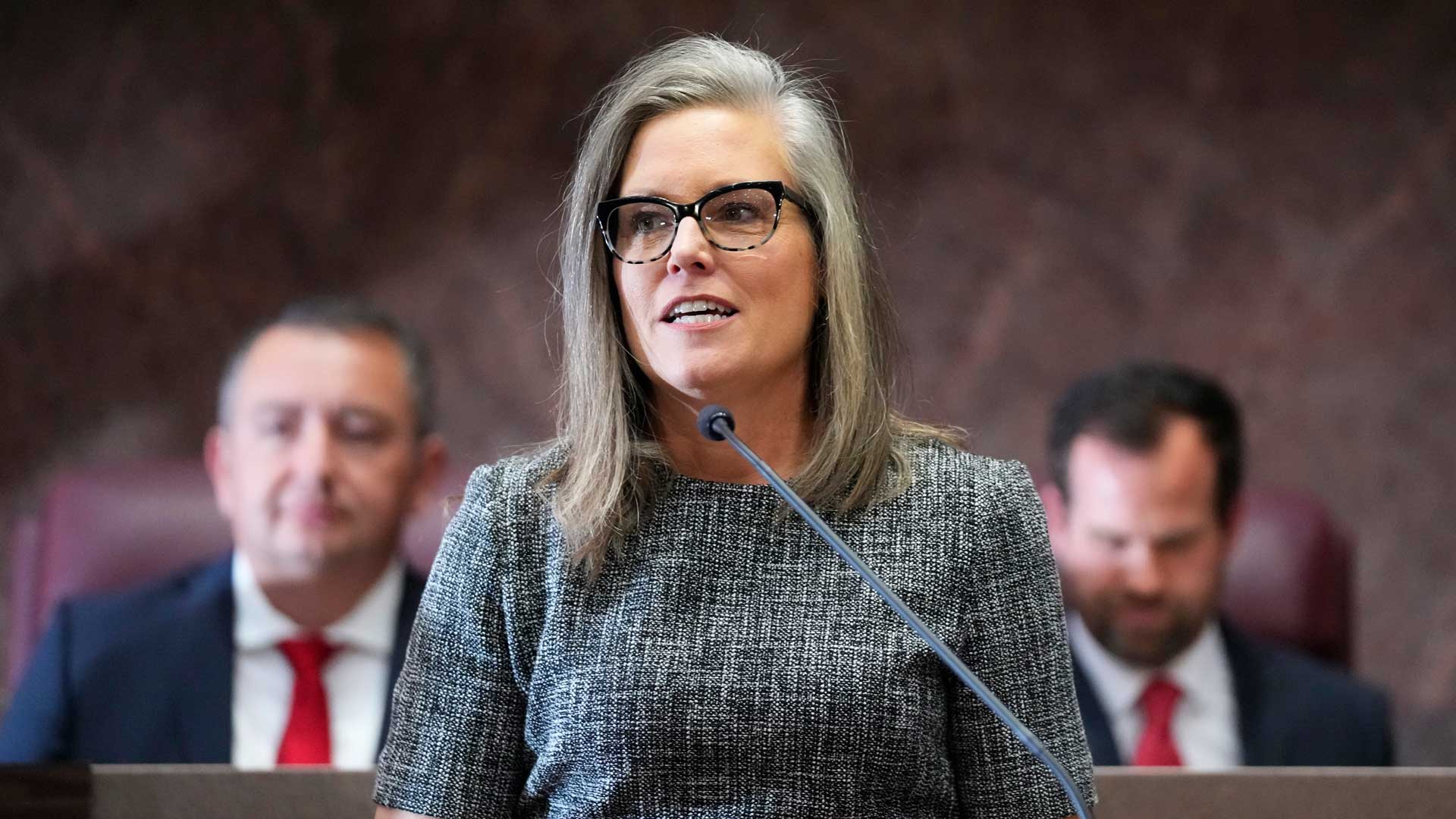 Democratic Arizona Gov. Katie Hobbs, center, is flanked by Arizona House Speaker Ben Toma, R-Glendale, left, and Arizona Senate President Warren Petersen, R-Gilbert, right, at Hobbs' state of the state address at the Arizona Capitol in Phoenix on Jan. 9, 2023.
Democratic Arizona Gov. Katie Hobbs, center, is flanked by Arizona House Speaker Ben Toma, R-Glendale, left, and Arizona Senate President Warren Petersen, R-Gilbert, right, at Hobbs' state of the state address at the Arizona Capitol in Phoenix on Jan. 9, 2023.
Arizona Gov. Katie Hobbs is facing heavy pushback from a victim’s sister and a powerful county prosecutor for her plans to defy a court order to execute a prisoner next month for his conviction in a 2002 killing. The newly elected Democratic governor vowed nearly two weeks ago that she wouldn’t carry out the Arizona Supreme Court’s order to execute Aaron Gunches on April 6, citing a review that she has ordered of death penalty protocols due to Arizona's history of mismanaging executions.
Hobbs has said executions will not be carried out until Arizonans can be confident the state isn’t violating the law. She maintains that while the court authorized Gunches’ execution, its order doesn’t require the state to carry it out.
Over the last several days, lawyers for Karen Price, whose brother Ted Price was the victim in Gunches’ case, and Maricopa County Attorney Rachel Mitchell have told the state’s highest court that Hobbs doesn’t have the legal authority to disregard the order.
In a statement, Karen Price said the relief her family felt when the court scheduled Gunches’ execution was dashed by Hobbs’ announcement.
“Not only has our family been victimized by inmate Gunches and the emotional aftermath of Ted’s murder, we are now being victimized by the governor’s failure to recognize and uphold our constitutional rights to justice and finality,” Price said.
Nicholas Klingerman, an attorney representing Mitchell, said no constitutional violations have been found with the state’s execution protocols and that carrying out execution warrants isn’t optional for the governor.
“Nothing in the Constitution or laws of Arizona or the warrant gives the governor discretion to ignore the warrant and grant what essentially constitutes a temporary reprieve from the death penalty,” Klingerman wrote.
Hobbs’ office has declined to comment on the filings by Price and Mitchell and their claims the governor doesn’t have the legal power to defy an order to execute a prisoner.
Richard Dieter, executive director of the Death Penalty Information Center, said he believes Hobbs, as the state’s chief executive, has the power to put the brakes on executions if she is concerned whether they are going to be carried out humanely and in a constitutionally sound manner. He said he doesn’t believe the courts can force Hobbs to carry out the execution.
“She has the power to make sure that that’s functioning properly,” said Dieter, whose group doesn’t take a position on the death penalty but is critical on how it’s carried out.
Dale Baich, a former federal public defender who teaches death penalty law at Arizona State University, said Hobbs has “discretion for situations like this, where the governor has expressed legitimate concerns because of the problems with the (lethal injection) drugs, the qualifications of the executioners and staffing at the Department of Corrections necessary to carry out executions.”
Mel McDonald, a former U.S. Attorney for Arizona who handled two death row cases as a prosecutor, predicted the state Supreme Court would take up the appeal filed by Price’s sister, saying the dispute presents the court with novel legal issues.
“It raises a lot of questions,” McDonald said of the dispute. “I wouldn’t be surprised if they accept jurisdiction (of the case). Where it goes from there is anyone’s guess.”
Arizona, which currently has 110 prisoners on death row, carried out three executions last year after a nearly eight-year hiatus brought on by criticism that a 2014 execution was botched and because of difficulties obtaining execution drugs.
Since resuming executions, the state was criticized in May for taking too long to insert an IV for lethal injection into a condemned prisoner’s body and for denying the Arizona Republic newspaper’s request to witness the last three executions.
Gunches was sentenced to death after pleading guilty to murder in the shooting death of Ted Price, his girlfriend’s ex-husband, near Mesa, Arizona.
Gunches, who isn’t a lawyer, represented himself in November when he asked the Supreme Court to issue his execution warrant so, he said, that justice could be served and the victims could get closure. In Republican Attorney General Mark Brnovich’s last month in office, his office asked the court for a warrant to execute Gunches.
But Gunches then withdrew his request in early January, and newly elected Democratic Attorney General Kris Mayes later asked for the execution warrant submitted during Brnovich’s tenure to be withdrawn.
The state Supreme Court rejected Mayes’ request, saying it must grant an execution warrant if certain appellate proceedings have concluded — and that those requirements were met in Gunches’ case.
In yet another reversal, Gunches said in a filing a week ago that he still wants to be executed and asked to be transferred to Texas, where he wrote “the law is still followed and inmates can still get their sentences carried out.”
Arizona’s highest court has since denied Gunches’ request to transfer to Texas.

By submitting your comments, you hereby give AZPM the right to post your comments and potentially use them in any other form of media operated by this institution.